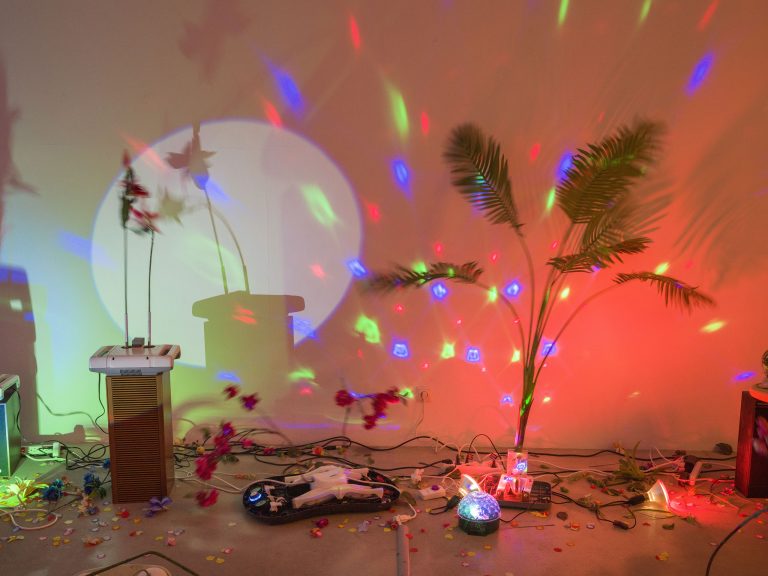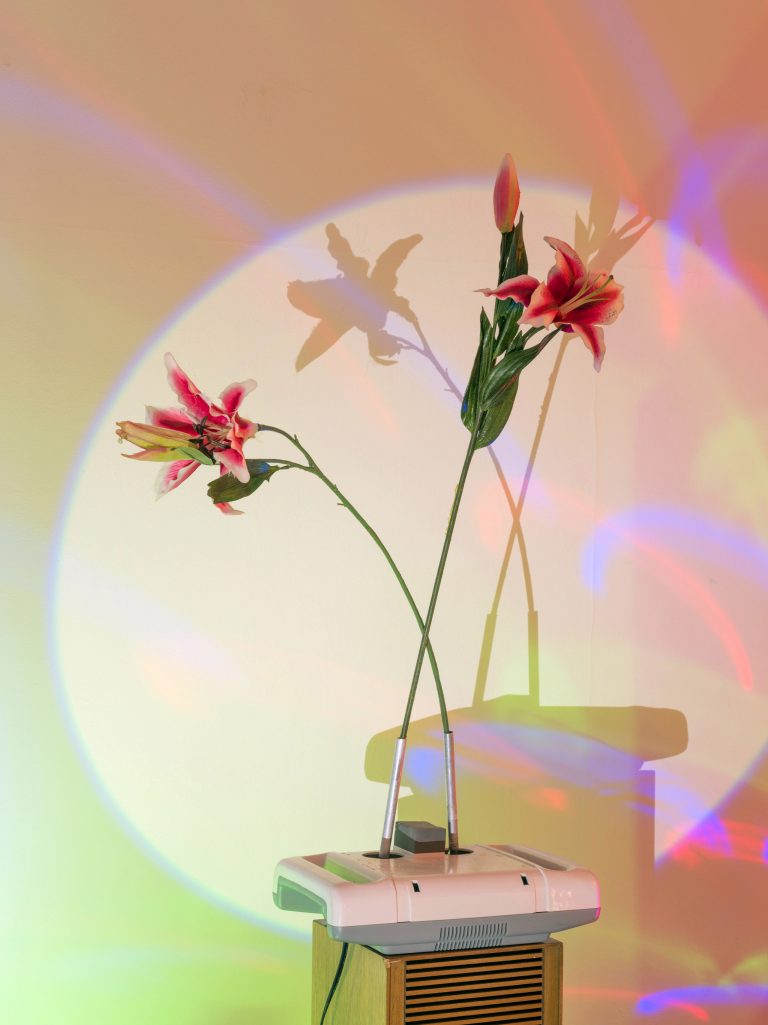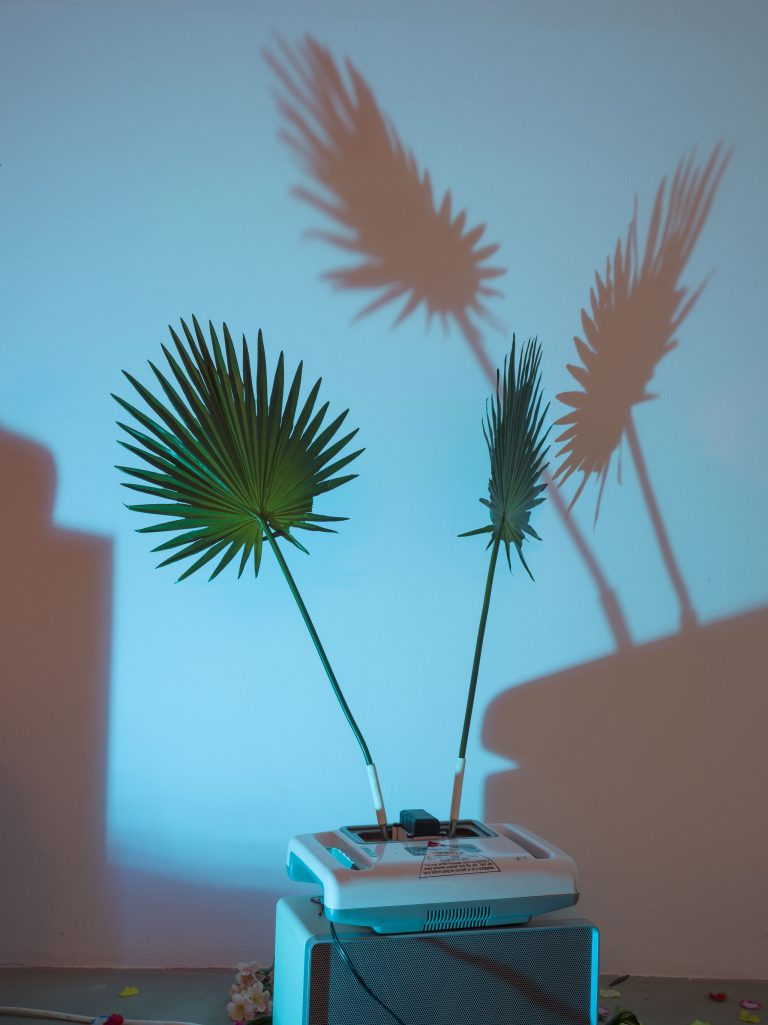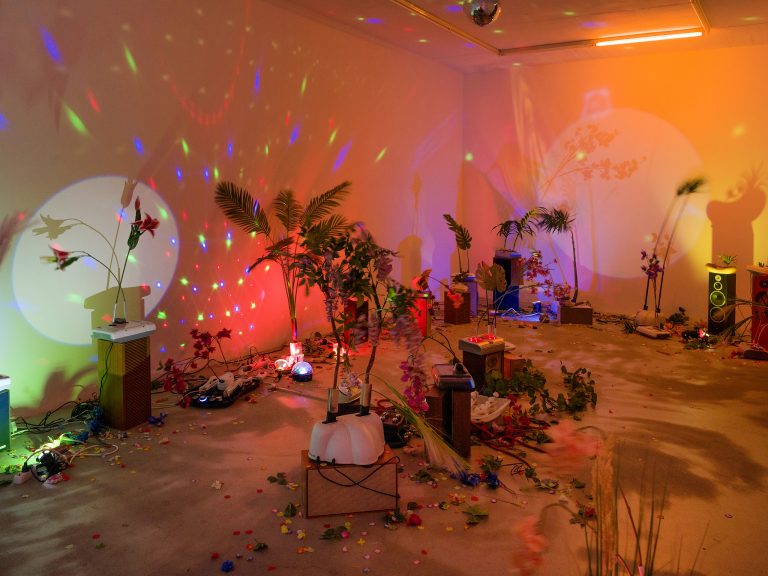Rachel Youn
Revival

Rachel Youn, Revival, installation view, 2022, Soy Capitán, Foto: Roman März, Courtesy the artist & Soy Capitán, Berlin
Humor is the open door that beckons the viewer in. The sculptures aimlessly flail about ad infinitum until the motor eventually burns out, and I think that’s a great metaphor for how I perceive my own life.
Rachel Youn
It’s quite apparent what is happening here. Plants attached to mechanical massagers are moving—or dancing, we might say, if dancing did not require the force of will—to music in a discotheque-like set- ting. The massagers are sourced second-hand. Their owners did not want them anymore; perhaps the machines did not live up to the owners’ expectations, or they stopped working. The plants are similar in that they are made out of plastic. As we humans are made self-conscious by our various failures to feel, say, like “real” men, women, Americans, or artists, we can imagine the plants, too, are burdened by a kind of imposter syndrome. And so, Rachel Youn wants to free these objects from the pressures of utility and authenticity. “But why?“ I asked, somewhat naively, “The objects don’t know.” “Good question,” Youn said.

Rachel Youn, Revival (detail), installation view, 2022, Soy Capitán, Foto: Roman März, Courtesy the artist & Soy Capitán, Berlin

Rachel Youn, Revival (detail), installation view, 2022, Soy Capitán, Foto: Roman März, Courtesy the artist & Soy Capitán, Berlin
I came to viscerally understand the way that mass prayer was my immigrant community’s way of expressing anguish from the cosmic loneliness in the Western world and a long history of colonization in Korea. My work finds commonality in spaces where queer communities and immigrant bodies find healing through collective bodily ecstasy.
Rachel Youn

Rachel Youn, Revival, installation view, 2022, Soy Capitán, Foto: Roman März, Courtesy the artist & Soy Capitán, Berlin
The only answer I can think of is that it is not about the objects, but what we—the viewers—can learn about ourselves from experiencing their manic, hopefully cathartic, unleashing of energy in the room. In both art and philosophy, this tends to be the case. In the latter especially, ordinary knickknacks, tools or home appliances are routinely called upon to serve as props in some thought experiment in which hu- mans are the real protagonists. Arm chairs, water jugs, brooms, sometimes even live things like dogs or chickens. In the writing of Jean-Paul Sartre, which comes to mind in my encounter with Youn’s work, we meet the paperknife and the plant as examples of two modes of existence that are different from our own, and for that reason might just shed some light on it. Exchange paperknife for second-hand massagers and Youn has staged an existentialist drama.
– Excerpt of the text by Kristian Vistrup Madsen
Rachel Youn (*1994 in Abington) received their BFA from the Sam Fox School of Design & Visual Arts at Washington University in St. Louis in 2017.
Youn has had solo exhibitions at Truman State University Art Gallery, Kirksville (2022), HAIR + Nails, Minneapolis (2021), the Contemporary Art Museum, St. Louis (2020), and the Bermuda Project, Fer- guson (2018). Their work has been included in group exhibitions at Night Gallery, Los Angeles (2022), Sargent’s Daughters, New York (2021), the Wassaic Project, Wassaic, New York (2021), Tiger Strikes As- teroid, Los Angeles (2019) and Granite City Art and Design District, Granite City, Illinois (2019) among others.
They received several grants and awards such as the Vermont Studio Center Fellowship (2019), the Great Rivers Biennial Award (2020) and the Foundation for Contemporary Arts Emergency Grant (2021).
Rachel Youn currently lives and works in St. Louis, MO.
